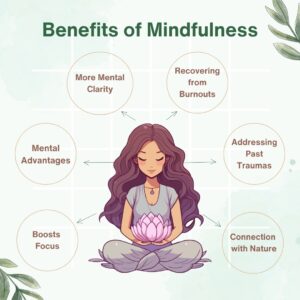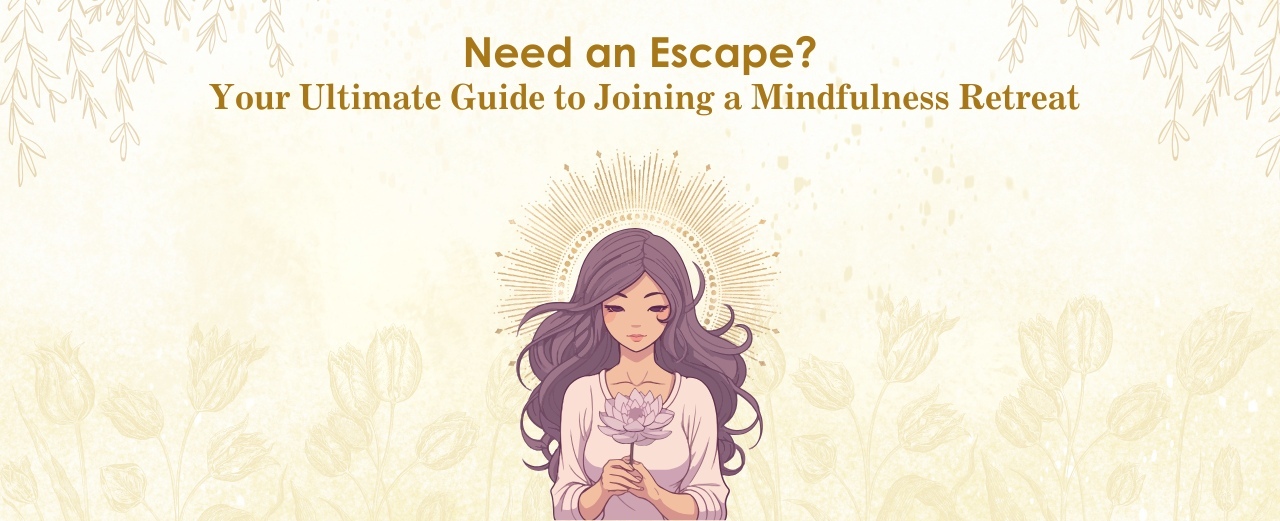Need an escape? Your Ultimate Guide to Joining a Mindfulness Retreat
When you look for the word “retreat” on Google, you can find two definitions. It either means “an act of withdrawing“ or “a quiet place where someone can rest and relax.“
In my opinion, retreating is more crucial now than ever in a world where there is an excessive amount of information, toxic effects from notifications, dings, bells, lights, and screens that are always trying to get our attention, as well as unreasonable demands and the hectic busyness of 21st-century life.
According to research, the average person consumes 74 gigabytes of information per day—the equivalent of 16 movies—from various sources, including social media, TV, computers, cell phones, and billboards.
Our neural systems are clearly struggling to keep up with the amount of information we ingest in a single day compared to our ancestors’ lifetimes. Taking this much information can leave us feeling anxious, perplexed, and overpowered.
Mindfulness: Understanding What it Means
Mindfulness is the art of being in the now, the present, aware, and paying attention to what’s happening right now. You can just hit the pause button on your busy mind, sit, observe, and be aware of your thoughts, feelings, and surroundings.

Here’s how you can think of it:
- Being Present: Sit outside. Instead of worrying about tomorrow or yesterday, breathe, feel the sun on your skin, and listen to birds. You are just noticing what’s going on at that moment.
- Focus on Now: Whatever you are doing, whether eating, walking, or talking to someone, actually pay attention to what you are doing. When eating, tasting, and chewing the food. If talking, try just listening to the other person.
Practicing mindfulness makes people feel calmer and more focused, making them better able to deal with whatever life throws their way.
Why Should You Attend a Mindfulness Retreat
Attending a mindfulness retreat is a way to maintain mental and emotional well-being and a transformative journey that can significantly enhance your life.
One of the best ways to treat yourself when you need calm, solitude, and contemplation is to go on a mindfulness retreat. Meeting yourself without all of life’s distractions might not be the most straightforward experience, but we promise it can be one of the most fulfilling.
Mindfulness retreats emphasize slowing down to develop a healthy body-mind connection and gain self-awareness. Wellness retreats come in a wide range of forms and variations, but they always share the trait of simplicity. Sometimes, taking a simple route is challenging enough.
During such retreats, people participate in various activities that help them attain mindfulness, consciousness, or awareness of their surroundings. These activities include yoga, meditation, and breathing exercises.
How is a Mindfulness Retreat Beneficial for You?
Mindfulness retreats are meant to promote awareness practices. Part of this technique is focusing on thoughts, breath, and physical sensations without judgment.
Studies suggest that mindfulness meditation practices may improve mental health and well-being by decreasing stress, anxiety, and depression. In all likelihood, during a mindfulness retreat, you will be engaged in supervised mindfulness meditation led by qualified teachers.
Mindfulness really is a lifesaver. It only takes a moment to sit and actually be present with what is happening, opening the door to a whole host of fantastic benefits- from less stress to much better mood and relationship-building skills; mindfulness practice will help ease and bring joy in everyday challenges. Let’s discuss some of the amazing ways mindfulness can enhance your life!

- Mental advantages
Taking a break from the never-ending responsibilities of daily living allows your mind to relax and recover. Along with reducing anxiety and depressive symptoms, meditation can help lower cortisol, the stress hormone. Moreover, meditation can improve your focus, help you stay in the now, and improve your attitude toward life.
- More mental clarity
These retreats help you improve your understanding of various things, encourage better sleep, and infuse a feeling of inner peace.
- Recovering from burnouts
Mindfulness Retreats can help you determine the signals of your burnout and give you approaches to stop it from recurring.
- Addressing past traumas
Retreats help people address past traumas, let go of unsaid sentiments, and learn more profound ways to cope with life’s hurdles.
- Connection with Nature
Retreats help you connect with nature, which does wonders for your mind and body.
Important Things to Consider While Choosing a Mindfulness Retreat
You must get the most from the investment, be it financial or spiritual, by researching all those options that interest you and weighing out what might feel easiest or most comfortable for you, regardless of the length, style, or place that interests you.
Note: If you are still unsure where to begin, seek out local meditation facilities or groups. They may offer their retreats or can point you in the direction of locations that their professors and students have enjoyed. Online reviews can help you decide if a retreat works for you.
Here are a few fundamental aspects you should look at as you search for the perfect meditation retreat.
1. Where you’ll be
First, decide if you want a retreat close to home for convenience or one more remote for complete disconnection.
Consider whether you prefer a natural setting like mountains, forests, or beaches to enhance your meditation experience — and remember that the temperature or humidity of a different climate might impact your comfort and ability to focus.
2. What type of meditation you will be practicing
Another important component of a retreat is the type of meditation you will practice during your time there. Most retreats will have several hours of mindfulness meditation broken up over the day, so it’s nice to feel comfortable—and even like—the practice. You can also consider what style may align best with your personal goals for the retreat.
3. How long you’ll be away
You should consider how long of a retreat you have an interest, time, and budget for. Mindfulness retreats vary from the short weekend up to the whole week. If you are just learning about mindfulness, then a weekend retreat is the thing for you.
This can be shorter in terms of dedication but just as good in giving you some practice without feeling overwhelmed. If you already have some experience and/or want to dive deeper, then a longer retreat of several days to a week is ideal. This allows much-needed disconnection from daily stress and the ability to immerse oneself in the experience.
A short retreat, like a weekend, can be the thing for newcomers or those with a tight schedule and provide a glimpse into meditation’s benefits. Longer retreats of one or two weeks allow much deeper practice and bigger, more fantastic experiences. These are best if you’re looking for significant personal growth.
4. The instructor’s experience level and qualifications
Always check out the teachers who will accompany and guide the retreat. The quality of instructors can wonderfully support your retreat experience.
Check out how many years the instructors have been practicing and teaching, what they will train you for, and what training or certifications they have in related fields. You may also check out testimonials to know their skills and approachability.
5. Cost and accommodations
While safety and comfort are important considerations, staying in relatively simple accommodations while away at the retreat can be a very helpful way to create a real shift away from distractions external to the experience and internal to it. Budget-friendly choices may range from quiet, primitive dormitory-style accommodations to others offering private rooms with facilities that border on the lavish.
Remember to budget for travel costs, especially if the retreat is far away. If you’re on an extremely tight budget, know that some retreat centers will offer scholarship funds and/or the ability to volunteer instead of paying for a reduced rate.
6. Schedule and activities
Some places keep a very structured regime and daily routine, while others provide more free time. Some retreats also have other activities, such as yoga or hiking, and can even host workshops that will benefit you, depending on your needs. Movement can complement the long days of seated meditation, so take a retreat whose schedule appeals to you and your body.
Final Thoughts
Mindfulness Retreats are places where our bodies can withdraw themselves from the busyness of everyday life, and relaxation can occur. Retreats are more necessary at this hour than ever because our nervous systems are not coping with information and sensory overload.
The many benefits of treating yourself to a retreat include me-time to the max, fresh perspectives, a sense of common humanity, deep relaxation, spiritual hygiene, transferable skills, refreshing, re-energizing, and re-empowering.
Join Me in a Transforming Retreat
If you want to discover yourself, I invite you to join me for a mindfulness retreat named “Speaking Peace: Deepening Connection” here in Udaipur. This retreat teaches the awareness of conscious communication, letting you connect better with people around you in a kinder and more meaningful way. You are sure to learn valuable skills, learn mindfulness, and develop better relationships- all in a calm and beautiful place.
Imagine sitting in a quiet place, learning from highly qualified instructors, and meeting the people who think similarly to you. That’s what you need to get more peaceful inside yourself.
Don’t miss this fantastic opportunity! You can still register for the retreat and find all the details on the Mindfulness Retreat page.
So, take this step for yourself and see how mindfulness can improve your life!
